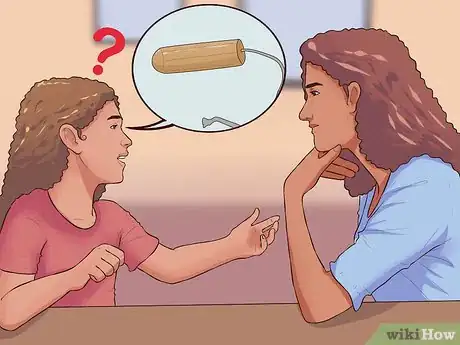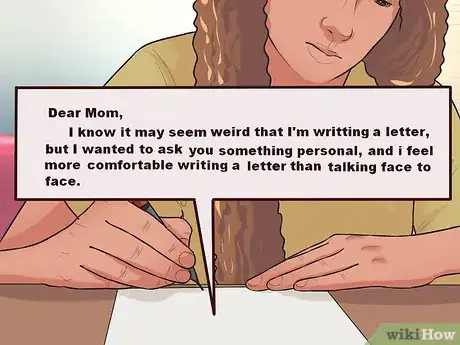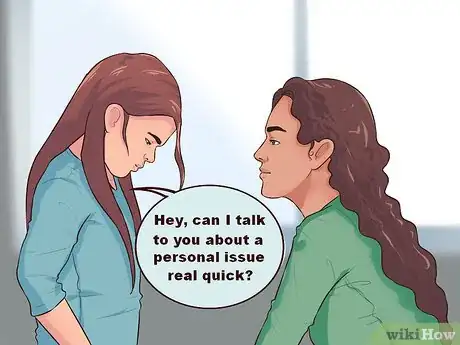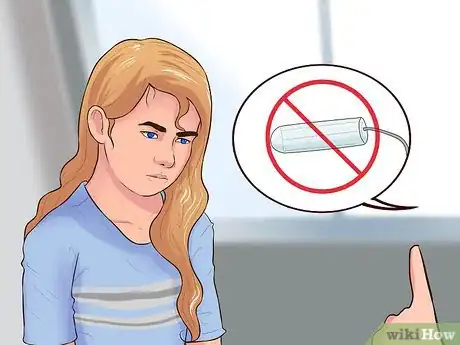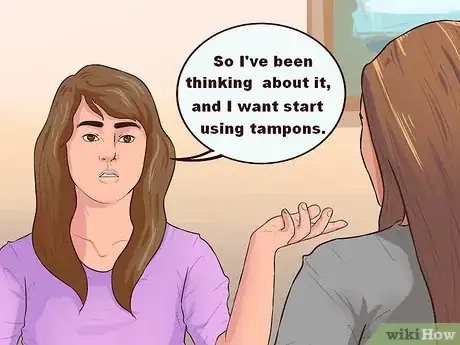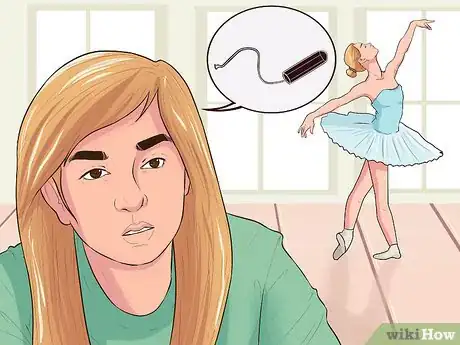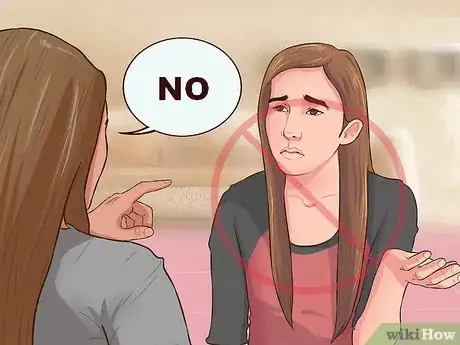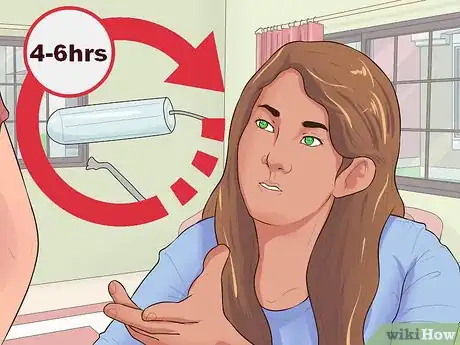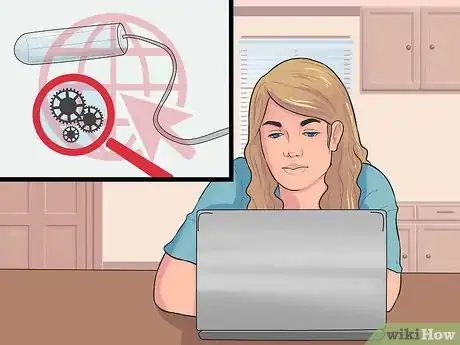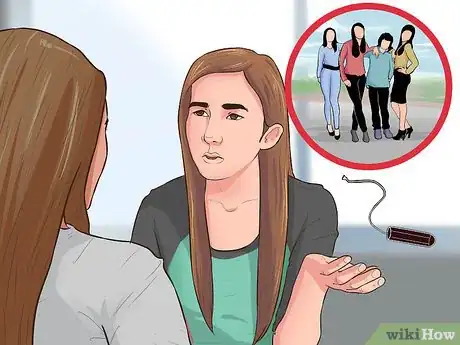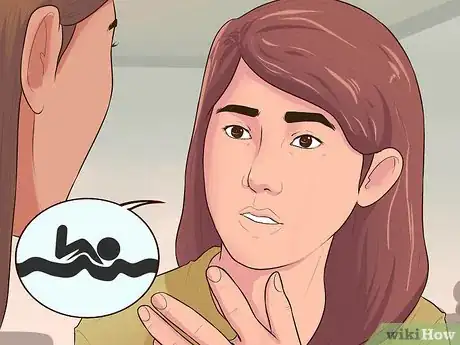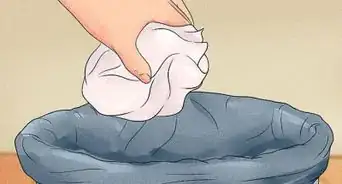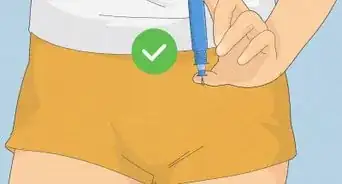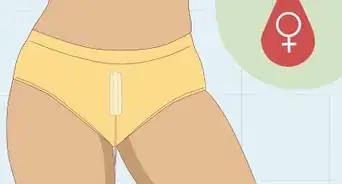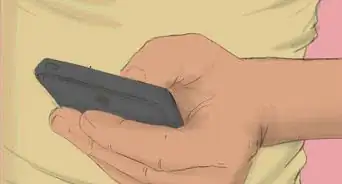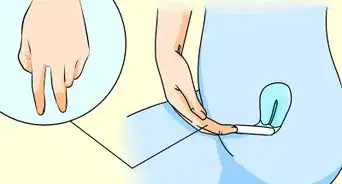This article was co-authored by Rebecca Levy-Gantt, MPT, DO. Dr. Rebecca Levy-Gantt is a board certified Obstetrician and Gynecologist running a private practice based in Napa, California. Dr. Levy-Gantt specializes in menopause, peri-menopause and hormonal management, including bio-Identical and compounded hormone treatments and alternative treatments. She is also a Nationally Certified Menopause Practitioner and is on the national listing of physicians who specialize in menopausal management. She received a Masters of Physical Therapy from Boston University and a Doctor of Osteopathic Medicine (DO) from the New York College of Osteopathic Medicine.
There are 11 references cited in this article, which can be found at the bottom of the page.
This article has been viewed 199,346 times.
Some girls are embarrassed to ask their moms about things like wearing a tampon. Overcome your fear of asking permission to use a tampon by preparing yourself with the right timing and materials. Be kind when you ask for permission, and don't whine if your parents say no.
Steps
Approaching the Subject
-
1Ask your parent/guardian for a private conversation. When you feel you are ready to use tampons instead of pads for your period, you may need to gain the permission of your parents (in many cases your mother). Gaining their permission is important because they buy your feminine products. It is also good for them to know what is going on in your life so that they can take care of you.
- For example, if your mom says she is headed to the store in an hour, ask her if you can have a talk before she goes.
- Perhaps send a quick text to ask your parent or guardian to meet with you so that when you see them face to face, they will be ready to listen. Say, “When I get home from school today, can we talk for a minute?”
-
2Write them a letter. If you feel embarrassed or stressed about talking to your parents about using tampons, try writing them a letter. You may also want to write a letter if it's hard to find time to sit down with them. Writing a letter helps you organize your thoughts and make a strong appeal.[1]
- Write down your thoughts in a logical order, such as opening with your desire to use tampons, describing why they are a good idea, explaining that you have the responsibility to handle them, and closing with a polite request.
- Revise your letter for proper wording and punctuation.
- You could open with, “Dear Mom, I know it may seem weird that I'm writing a letter, but I wanted to ask you something personal, and I feel more comfortable writing a letter than talking face to face.”
- You could also consider making it electronic, either writing a text or email, if that is something your parent or guardian would read.
Advertisement -
3Talk to someone you trust. If talking to a parent or guardian is too difficult, either emotionally or logistically, you may want to talk to another trusted adult first. Get advice from them on how to approach your parents. Discuss your fears with them. They may be able to offer advice that makes you feel less uncomfortable than talking to your own parents.[2]
- Another adult you might discuss this with is your doctor. Your doctor can offer medical advice about tampon application, calming the fears of both you and your parents.
- Pull aside a trusted adult and ask, “Hey, can I talk to you about a personal issue real quick?”
- This can also be an experienced friend.
-
4Be prepared to be denied. Part of asking for permission is being ready to have your request denied. Your parents may not feel you are emotionally prepared for such a step. They may think you need to be a little older, or that tampons aren't safe. Be prepared to show maturity by not getting upset at their refusal.
- Think about their personalities and your past experiences with them to help you anticipate what they might say.
- Ask why they won't agree to let you use a tampon in a respectful manner.
- Not getting upset can be the sign of maturity your parents need to agree to let you start using tampons. For example, a mature person is thankful, meaning they express gratitude even when things don't go their way.[3]
- Understand that your parents are most likely interested in your safety and are not trying to be mean.
Asking for Permission
-
1Tell them what is going on. Once you have your parents' attention, tell them about your desire to use tampons. You want them to clearly understand your position. Even if you don't think they will understand, you need to express your desire anyway.
- Start by saying something like, “So I've been thinking about it, and I want start using tampons.”
-
2Explain why you want to use tampons. Explaining all the reasons why you want to do something is important for helping the other person become convinced. Use persuasion tactics like proper timing, being willing to do something in return, and being persistent. Your parents will probably be impressed by a logical argument made without whining.[4]
- Choose to ask your parents for a discussion about tampons when they are relaxed, not right after they get home from work.
- Be willing to do chores or another task they have been wanting you to accomplish in return for permission to use tampons.
- If they say no at first, meet any conditions they offer and ask them again. Keep asking until they relent.
- Try, “I am old enough for tampons and I need them because I play sports.”
-
3Ask with a polite manner. Be kind and polite when you ask for permission. Make eye contact with your mom or dad and say nice things about them. Don't flatter them to get them to agree with you; instead, be genuine with any compliments you give. Also avoid fidgeting, whining, or accusing them if you don't like their response.
- Say, “Thank you for taking time to meet with me today.”
- Use words like can, could, may, might, would, and so on.[5] These words are humble rather than demanding, and will likely help you get what you want.
- For example, say, "I would like to start wearing tampons," instead of, "I have to wear tampons now."
-
4Avoid whining if they say no. If the answer is “no,” don't throw a fit. This will only assure your parents that you are not ready for the responsibility of using tampons. Instead of whining, complaining, or being out of sorts, accept their judgement calmly.
- Don't tattle on a sibling in order to make yourself look better.
- If your older sister uses tampons without your parents' permission, for example, telling on her to get your way might cause family drama rather than help your case.
Making Your Case
-
1Calm their fears. When you are presenting your appeal to your parents to use tampons, you may want to start by calming their fears. For example, if they are worried you will get sick from using tampons, assure them that you know when to take out your tampon. If they are worried that you will use it improperly, assure them that you have learned how to use a tampon correctly.
- For example, explain that you know you should change a tampon every four to six hours.[6]
-
2Demonstrate that you have researched tampons. Start by printing out web pages. You can show your parents that you have read about how to apply a tampon properly. You can also show that you have read about the risks.
- Show that you have read up on Toxic Shock Syndrome and how to prevent it.[7]
- Also show proof that your age doesn't have anything to do with your ability to use tampons. Any girl with a menstrual cycle can use a tampon.[8]
- Explain how tampons are perfectly safe for both virgins and non-virgins. The tampon does not interfere with the hymen (the skin covering the vagina).[9]
- Make them aware that tampons can't enter the body, so they are a safe alternative to pads.[10]
-
3Offer stories of others your age. Tell your parents about your friends who are in similar situations to your own, such as the same age and playing the same sports. Explain that they wear tampons and are perfectly fine.
- If you are feeling left out because you are not allowed to wear tampons, explain this to your parents.
- If anyone tries to bully you for not wearing tampons, tell an adult immediately.
- You can tell you are being bullied if you are being singled out on an ongoing basis; the bully is bigger than you in stature or has a stronger personality; and enjoys it when you are uncomfortable.[11]
-
4Explain situations where you need them. The reason tampons are an option on the market at all is because active women need them. If you play a sport like swimming, you physically should not swim unless you can contain your menstrual cycle; otherwise you might contaminate the water. You can play any sport better with a tampon.
- Other situations you might want a tampon include wearing tight clothing, having to change clothes in a public dressing room, or for the sake of comfort.
Expert Q&A
-
QuestionWhat happens if the string on my tampon breaks off?
 Rebecca Levy-Gantt, MPT, DODr. Rebecca Levy-Gantt is a board certified Obstetrician and Gynecologist running a private practice based in Napa, California. Dr. Levy-Gantt specializes in menopause, peri-menopause and hormonal management, including bio-Identical and compounded hormone treatments and alternative treatments. She is also a Nationally Certified Menopause Practitioner and is on the national listing of physicians who specialize in menopausal management. She received a Masters of Physical Therapy from Boston University and a Doctor of Osteopathic Medicine (DO) from the New York College of Osteopathic Medicine.
Rebecca Levy-Gantt, MPT, DODr. Rebecca Levy-Gantt is a board certified Obstetrician and Gynecologist running a private practice based in Napa, California. Dr. Levy-Gantt specializes in menopause, peri-menopause and hormonal management, including bio-Identical and compounded hormone treatments and alternative treatments. She is also a Nationally Certified Menopause Practitioner and is on the national listing of physicians who specialize in menopausal management. She received a Masters of Physical Therapy from Boston University and a Doctor of Osteopathic Medicine (DO) from the New York College of Osteopathic Medicine.
Board Certified Obstetrician & Gynecologist First, don't panic. You'd be surprised how often this happens. I've had plenty of patients show up in my office with this problem. The best thing you can do is just grab a lubricant and put a glove on. Then, just gently try to slide it out. Remember, there isn't an unlimited amount of space in there. The tampon isn't gone forever and you aren't going to need surgery or anything like that.
First, don't panic. You'd be surprised how often this happens. I've had plenty of patients show up in my office with this problem. The best thing you can do is just grab a lubricant and put a glove on. Then, just gently try to slide it out. Remember, there isn't an unlimited amount of space in there. The tampon isn't gone forever and you aren't going to need surgery or anything like that.
Warnings
- Never put a tampon in if you're not menstruating or for discharge.⧼thumbs_response⧽
- Toxic Shock Syndrome (TSS) is extremely rare and can usually be prevented by regularly changing a tampon. However, being aware of the symptoms can prevent problems.⧼thumbs_response⧽
- Always change your tampon every four to six hours, or when it is saturated.⧼thumbs_response⧽
- TSS symptoms include muscle aches, headache, redness of the eyes, a sudden high fever, dizziness or light headedness, vomiting, diarrhea, or a rash like a sunburn.[12]⧼thumbs_response⧽
References
- ↑ http://www.yourlifeyourvoice.org/Pages/tip-letter-to-your-parents.aspx
- ↑ Rebecca Levy-Gantt, MPT, DO. Board Certified Obstetrician & Gynecologist. Expert Interview. 3 April 2020.
- ↑ https://www.psychologytoday.com/blog/artificial-maturity/201211/the-marks-maturity
- ↑ http://www.forbes.com/sites/jasonnazar/2013/03/26/the-21-principles-of-persuasion/#721192ca53be
- ↑ https://learnenglish.britishcouncil.org/en/english-grammar/verbs/modal-verbs/ability-permission-requests-and-advice
- ↑ http://youngwomenshealth.org/2012/09/27/tampons/
- ↑ http://youngwomenshealth.org/2012/09/27/tampons/
- ↑ http://youngwomenshealth.org/2011/06/15/age_to_start_tampons/
- ↑ http://youngwomenshealth.org/2011/08/10/tampons_and_virginity/
About This Article
Before asking for permission to use tampons, think of a few solid reasons why you’d need them, like the fact they’ll make playing sports easier. Then, schedule a time to talk with your parents, and tell them you want to use tampons as directly as you can. For example, you might say: “I think I’m old enough to use tampons and need them for swimming practice.” You can also reassure your parents about safety, saying: “I know I can’t use them for more than 8 hours, and I’ll make sure to change them regularly.” Finally, be sure to thank your parents for listening, no matter what they say. Keep reading for more advice, including what to do if your parents still say no.
